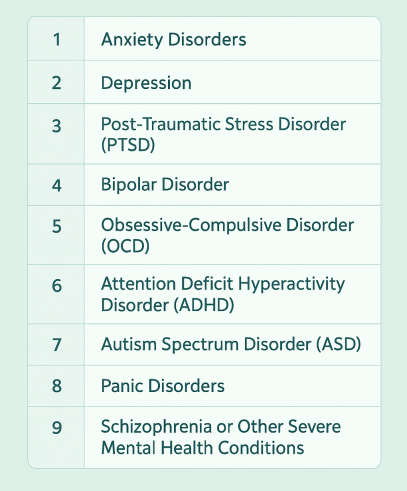

ESA Letter Doctor: Complete Guide to Getting an Emotional Support Animal Letter
by Nida Hammad
Last updated: October 30, 2025
Verified and Approved by:
Angela Morris,
MSW, LCSW
Fact Checked

Getting an ESA letter from a qualified ESA letter doctor is crucial for legally protecting your right to live and travel with an emotional support animal. These letters serve as legal documentation that confirms your emotional or mental health condition and your need for an ESA’s companionship.
However, many people struggle to understand who can write ESA letters and how to find legitimate ESA providers. With the rise of online scams and unlicensed services, knowing what makes an ESA letter valid is more important than ever.
This guide will help you navigate the process of obtaining a legitimate emotional support animal letter. You’ll learn who can issue it, how to verify a licensed ESA provider, and what to expect during your consultation. Whether you’re seeking peace of mind at home or traveling with your pet, understanding the ESA documentation process ensures your rights are protected.
What Is an ESA Letter Doctor?

An ESA letter doctor is a licensed mental health professional who can officially recommend an emotional support animal (ESA) to individuals dealing with emotional or psychological challenges. This recommendation comes in the form of an emotional support animal letter, which serves as proof that the person benefits from the companionship of an animal to improve mental well-being.
Types of Mental Health Professionals Who Can Write ESA Letters
Only specific professionals can issue legitimate ESA letters. They include:
- Licensed Clinical Social Workers (LCSWs)
- Psychologists (Ph.D. or Psy.D.)
- Psychiatrists (M.D. or D.O.)
- Licensed Professional Counselors (LPCs)
- Licensed Marriage and Family Therapists (LMFTs)
- Primary Care Physicians (in some states)
These professionals assess your emotional health, determine if you qualify for an ESA, and provide the documentation required for housing or travel accommodations.
Required Qualifications and Licensing
To ensure your ESA letter doctor is legitimate, check the required qualifications of healthcare professionals:
- State License Number: The doctor or therapist must hold an active license in your state of residence.
- Professional Credentials: Verify their degree and specialization (e.g., psychology, psychiatry, counseling).
- Experience in Mental Health: They should have a background in diagnosing or treating emotional or psychological conditions.
State-Specific Requirements
Each U.S. state may have slightly different rules about who can issue an ESA letter. For example:
- Some states require that the doctor or therapist be licensed in the same state where you live.
- Certain states have stricter verification requirements to prevent fraud.
When you work with a licensed ESA provider, you can rest assured that your emotional support animal letter is legally valid and recognized under federal housing laws.
How to Find a Legitimate ESA Letter Doctor

With so many online services offering ESA letters, identifying a legitimate ESA letter doctor can be confusing. Some websites promise instant approvals without proper evaluations, a red flag that the letter may be invalid.
Online vs. In-Person Providers
Both online and in-person consultations are acceptable, as long as the provider is licensed and follows the proper evaluation process.
- Online Providers: Many legitimate platforms, like Wellness Wag, connect you with licensed mental health professionals for virtual consultations. These are convenient and legally recognized when done correctly.
- In-Person Providers: Visiting your local psychologist or psychiatrist is also valid, especially if you already have an ongoing treatment plan.
The key is to confirm that the doctor performing your evaluation is licensed to practice in your state.
Red Flags to Watch For
Avoid scams by being aware of warning signs such as:
- Instant ESA approvals with no evaluation
- Websites that don’t list doctor credentials
- Lack of state licensing information
- Promises of “registration” or “certificates” (there is no official ESA registry
- Requests for payment before consultation
Legitimate ESA providers will conduct a proper evaluation and issue an official ESA documentation letter only if you qualify.
Verification Process
To verify if your ESA letter doctor is legitimate:
- Check the state licensing board website.
- Look for NPI (National Provider Identifier) numbers.
- Ensure the provider’s name and credentials appear on the ESA documentation.
Legitimate Platforms
A few well-reviewed ESA platforms provide secure, authentic services. They connect patients with mental health professional ESA evaluators who follow all legal standards.
When you choose a trusted provider like Wellness Wag, you’ll receive a legitimate ESA letter that complies with federal guidelines and is backed by licensed mental health experts.
Discover complete details, requirements, and step-by-step guidance for Michigan ESA letters.
The ESA Letter Evaluation Process

Getting an ESA letter involves more than filling out an online form, it requires a genuine mental health assessment.
What to Expect During Consultation
During your appointment, whether virtual or in-person, your ESA letter doctor will:
- Discuss your emotional and mental health symptoms.
- Review your personal and medical history.
- Determine if you have a condition that qualifies for an ESA recommendation.
- Evaluate how an animal could help alleviate your symptoms.
Required Documentation
You may be asked to provide:
- Medical or psychological history
- Details of your current emotional challenges
- Previous treatment records (if available)
- Identification for verification purposes
The evaluation must be individualized, mass-generated ESA letters without proper assessment are not legally valid.
Assessment Procedures
The licensed ESA provider conducts a mental health screening, which may include questionnaires or direct discussions about your daily functioning, anxiety levels, or emotional stability.
If you qualify, the provider will issue your emotional support animal letter on official letterhead, including:
- Provider’s full name and credentials
- License number and state of practice
- Date of issuance and signature
- Statement confirming your need for an ESA
Qualifying Medical Conditions for an ESA Letter

To qualify for an Emotional Support Animal (ESA) letter, a person must have a mental or emotional disability diagnosed by a licensed healthcare professional. This letter confirms that the animal provides comfort and helps reduce symptoms linked to the condition.
Below are some of the common medical conditions that may qualify you for an ESA letter:
1. Anxiety Disorders
People with generalized anxiety, panic attacks, or social anxiety often find relief through the companionship of an emotional support animal.
2. Depression
An ESA can help those struggling with sadness, low motivation, an eating disorder, or feelings of loneliness by offering unconditional love and emotional stability.
3. Post-Traumatic Stress Disorder (PTSD)
Individuals dealing with trauma may benefit from the calming and grounding presence of an emotional support animal.
4. Bipolar Disorder
ESAs can provide balance and emotional support during mood swings, helping create a sense of consistency and calm.
5. Obsessive-Compulsive Disorder (OCD)
The presence of an ESA may help individuals manage intrusive thoughts and reduce repetitive behaviors.
6. Attention Deficit Hyperactivity Disorder (ADHD)
Emotional support animals can help increase focus, routine, and emotional regulation for people with ADHD.
7. Autism Spectrum Disorder (ASD)
An ESA can provide comfort and help with sensory overload, communication, and social connection for those with autism.
8. Panic Disorders
Having an ESA nearby can ease physical and emotional symptoms during panic episodes, offering immediate reassurance.
9. Schizophrenia or Other Severe Mental Health Conditions
While treatment should always involve professionals, an ESA can add emotional stability and a sense of safety for individuals with severe psychiatric conditions.
Important Note
Not everyone with these conditions automatically qualifies. You must have an official diagnosis and a recommendation letter from a licensed mental health professional confirming that an ESA is part of your treatment plan.
Discover tips for living with an emotional support animal for chronic pain relief.
Cost and Insurance Considerations
Average Fees
The cost of obtaining an ESA letter varies depending on the provider and whether the consultation is online or in-person. On average, legitimate ESA letters range between $100–$250.
Insurance Coverage Options
While most insurance plans don’t directly cover ESA evaluations, some mental health professional ESA services may offer reimbursement if you have a behavioral health benefit under your insurance plan.
Check with your insurance provider about:
- Out-of-network coverage for licensed therapists
- Telehealth reimbursement policies
- Flexible Spending Account (FSA) or Health Savings Account (HSA) eligibility
Typical Price Ranges
- Housing ESA Letter: $100–$150
- Travel ESA Letter: $150–$200
- Combined Letters: $200–$250
Some providers offer payment plans or money-back guarantees, especially if your ESA documentation is denied by a landlord.
Choosing a transparent and licensed ESA provider ensures your payment goes toward a legitimate service.
Legal Requirements and Validity
Federal and State Laws
Two main laws protect individuals with emotional support animals:
- Fair Housing Act (FHA):
This law ensures you can live with your ESA even in housing with “no-pet” policies. Landlords must make reasonable accommodations once you present a valid emotional support animal letter.
(External Link: Fair Housing Act guidelines) - Air Carrier Access Act (ACAA):
While airlines no longer have to allow ESAs in cabins (post-2021 changes), some may still offer flexibility for therapeutic support animals. Always check airline-specific policies.
Letter Renewal Requirements

Renewing Your ESA Letter: A Step-by-Step Guide
Keeping your Emotional Support Animal (ESA) letter up to date is important to maintain the legal protections and benefits that come with having an ESA. Most ESA letters are valid for one year, so it’s essential to check the expiration date and start the renewal process on time.
How to Determine if Your ESA Letter Needs Renewal
To see if your ESA letter needs renewal:
- Check the expiration date: Most letters are valid for one year.
- Assess your mental health needs: Consult a licensed mental health professional to determine if you still need an ESA.
- Ensure legal protections: An active ESA letter is required for housing and travel accommodations.
Gathering the Necessary Documentation
Before submitting your renewal application, make sure you have all required documents ready:
- Letter from a licensed mental health professional confirming your continued need for an ESA
- Updated medical records or treatment plans
- Supporting documentation showing the positive impact of your ESA (e.g., testimonials from friends or family)
- Personal statement describing your ongoing need for the ESA, with specific examples of how it supports your mental health
Having well-organized documentation and a clear personal statement strengthens your case for renewal.
Consulting with a Licensed Mental Health Professional
A licensed mental health professional is key to renewing your ESA letter. Here’s why:
- Accurate assessment: They evaluate your symptoms, history, and previous treatments to confirm your need for an ESA.
- Updated treatment plan: If your condition has changed, they can recommend therapies, medications, or lifestyle adjustments.
- Documentation of need: They provide a professional letter detailing your condition and how your ESA helps alleviate symptoms.
- Professional guidance: They guide you through the renewal process, answer questions, and ensure your documentation meets requirements.
Submitting Your Renewal Application and Fees
Once your documentation is ready:
- Submit your renewal application: Follow instructions carefully to avoid delays.
- Pay any required fees: Fees vary by ESA provider or registry, so check their website for the most current information.
- Set reminders: Make sure to submit on time to maintain continuous ESA status.
By staying organized and working with a licensed mental health professional, you can renew your ESA letter smoothly and continue to enjoy the support and benefits your emotional support animal provides.
Protect your emotional support animal’s rights in Ohio. Get a valid ESA letter from a qualified professional and enjoy housing and travel accommodations.
Fair Housing Act Compliance
The Fair Housing Act (FHA) protects individuals with disabilities by allowing them to keep a service animal or emotional support animal in housing, even if the property has a “no pets” policy. Here’s what you need to know:
- Emotional Support Animals (ESAs) are considered a reasonable accommodation under the FHA. Landlords cannot refuse an ESA if the tenant provides proper documentation from a licensed mental health professional.
- Service animals are also protected under the FHA, and landlords must allow them without extra fees or deposits.
- Landlords may request documentation for ESAs, but they cannot ask for detailed medical records or the specific nature of the disability.
- Both ESAs and service animals must behave appropriately and not pose a direct threat to others or cause property damage.
- The FHA applies to rental apartments, condos, and housing complexes, ensuring that people with disabilities have equal access to housing opportunities.
Always keep both physical and digital copies of your ESA documentation for quick access.
Air Carrier Access Act
Passengers with disabilities have the right to travel with a service animal under the Air Carrier Access Act (ACAA). Airlines must allow a service animal to accompany a passenger unless:
- The animal presents a safety risk
- The animal is too large to fit or be accommodated on the plane
- The animal causes a significant disruption during the flight
What Is a Service Animal on an Airline?
- A service animal is a dog of any breed or type trained to perform tasks or work for the benefit of a passenger with a disability.
- Disabilities can include physical, sensory, psychiatric, intellectual, or other mental conditions.
Airline personnel may ask two questions to verify a service animal:
- Is the animal required to accompany the passenger because of a disability?
- What work or task has the animal been trained to perform?
Documentation Requirements
- Passengers may be asked to provide a current, completed U.S. Department of Transportation Service Animal Air Transportation Form at least 48 hours before the flight.
- Always check your airline’s website for specific rules and forms related to traveling with a service animal.
Conclusion
Working with a qualified ESA letter doctor is essential for obtaining legitimate ESA documentation that protects your rights in housing and travel. These licensed mental health professionals not only ensure legal compliance but also provide emotional validation and ongoing support for your well-being.
Before committing to a provider, verify their license, credentials, and experience to avoid scams. A genuine mental health professional ESA consultation includes a personal evaluation and clear documentation signed by a licensed expert.
Emotional support animals can make a profound difference in managing anxiety, depression, PTSD, and other emotional challenges. The right ESA letter doctor helps make that bond legally recognized and protected.
If you’re ready to experience the benefits of a certified emotional support animal, schedule a consultation with a licensed ESA provider today and take the first step toward emotional healing and peace of mind.
Frequently Asked Questions
Who can legally write an ESA letter?
ESA letters must be issued by licensed mental health or medical professionals, including:
Licensed Clinical Social Workers (LCSWs)
Psychologists (Doctor of Philosophy – Ph.D. or Doctor of Psychology – Psy.D.)
Psychiatrists (Doctor of Medicine – M.D. or Doctor of Osteopathic Medicine – D.O.)
Licensed Professional Counselors (LPCs)
Licensed Marriage and Family Therapists (LMFTs)
Primary Care Physicians (in some states)
These professionals are authorized to evaluate your emotional or psychological condition and determine if you qualify for an emotional support animal.
Can I get an ESA letter online?
Yes, online consultations are valid if the provider is licensed in your state and conducts a proper mental health evaluation. Platforms like Wellness Wag connect you with licensed professionals who provide legitimate ESA letters after a proper assessment.
What conditions qualify for an ESA letter?
Common medical and mental health conditions that may qualify for an ESA letter include:
Anxiety Disorders (generalized anxiety, panic attacks, social anxiety)
Depression (including low motivation, sadness, eating disorders, loneliness)
Post-Traumatic Stress Disorder (PTSD)
Bipolar Disorder
Obsessive-Compulsive Disorder (OCD)
Attention Deficit Hyperactivity Disorder (ADHD)
Autism Spectrum Disorder (ASD)
Panic Disorders
Schizophrenia or other severe mental health conditions
You must have a diagnosis from a licensed professional who confirms that an emotional support animal helps alleviate symptoms related to your condition.
How do I verify if an ESA provider is legitimate?
Check their state license, credentials, NPI number, and confirm they are a licensed mental health professional in your state. Avoid instant approval sites.
Can anyone with a mental health condition automatically get an ESA letter?
No. You must have a diagnosis from a licensed professional who evaluates your mental health and determines that an ESA is part of your treatment plan.
Certify Your Emotional Support Animal Today

- National Service Animal Registry. (n.d.). Who can write a legitimate ESA letter? https://www.nsarco.com/who-can-write-a-legitimate-esa-letter/
- Service Dog Certifications. (n.d.). Who can write an ESA letter? https://www.servicedogcertifications.org/write-esa-letter/
- URP Behavioral Health. (n.d.). What disabilities qualify for an emotional support animal? https://urpbehavioralhealth.com/blog/what-disabilities-qualify-for-an-emotional-support-animal
- U.S. Department of Housing and Urban Development. (n.d.). Housing discrimination under the Fair Housing Act. Retrieved October 27, 2025, from https://www.hud.gov/program_offices/fair_housing_equal_opp/fair_housing_act_overview
- U.S. Code. (n.d.). 49 U.S.C. § 41705 — Discrimination against individuals with disabilities. Legal Information Institute, Cornell Law School. Retrieved October 27, 2025, from https://www.law.cornell.edu/uscode/text/49/41705
Why You Can Rely on Us?
At Wellness Wag, we believe your pet deserves care rooted in both science and compassion. Each article is carefully researched, written in clear language for pet owners, and then reviewed by qualified professionals to ensure the information is evidence-based, current, and practical for real-life care. Our goal is to help you feel confident in making informed decisions about your pet’s health and well-being.
Reviewed by
Angela Morris, MSW, LCSW
Angela is a licensed clinical social worker with 20 years of experience in patient advocacy and community mental health. She has assisted numerous clients with ESA evaluations and brings a deep understanding of disability accommodations, ensuring that all information is accurate, supportive, and practical.

Written by :
Nida Hammad
Last Updated :
October 30, 2025












